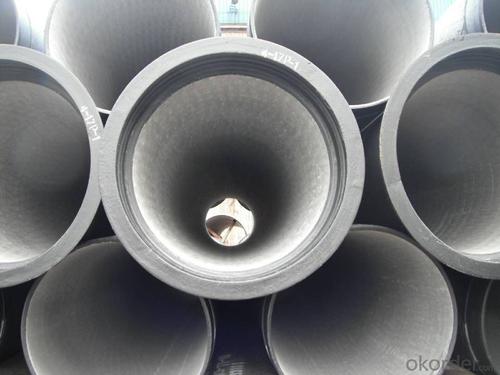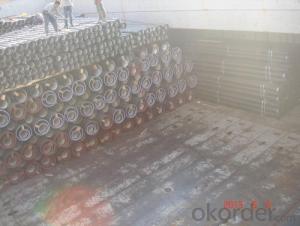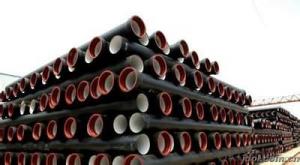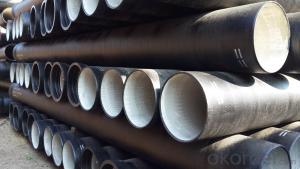DUCTILE IRON PIPE DN1200
- Loading Port:
- China Main Port
- Payment Terms:
- TT OR LC
- Min Order Qty:
- -
- Supply Capability:
- -
OKorder Service Pledge
OKorder Financial Service
You Might Also Like
Specification:
1) The standard of pipe: ISO2531:1998, K9
2) Effective length: 6m
3) Inner cement line: Portland cement line as per ISO4179
4) Zinc coating: at least 130g/m2 as per ISO8179
5) Bitumen painting: at least 70um as per ISO8179
6) With 100% quantity of NBR ring, or SBR ring, or EPDM ring as per ISO4633
7) DN80mm-800mm
8) High strength, lighter than grey iron, good corrosion resistance, no furring, small flow resistance, easy fixing, long life tome about 100 yeas
9) Produced by Hangzhou chunfeng machine
10) Checked by automatic inspection equipment
11) Composition:
Chemical composition | |||
Chemical composition | Ductile Cast Iron Pipe (%) | Grey iron pipe (%) | Steel pipe (%) |
C | 3.5-4.0 | 3.2-3.8 | 0.1-0.2 |
Si | 1.9-2.6 | 1.4-2.2 | 0.15-0.4 |
Mn | 0.15-0.45 | 0.4-0.6 | 0.3-0.6 |
P | ≤0.06 | ≤0.3 | 0.02-0.03 |
S | ≤0.02 | ≤0.1 | 0.02-0.03 |
Mg | 0.03-0.06 |
|
|
12) Feature:
Mechanical properties | |||
| Ductile Cast Iron Pipe | Grey Iron Pipe | Steel Pipe |
Tensile Strength(Mpa) | ≥420 | 150-260 | ≥400 |
Yield Strength(Mpa) | ≥300 | No Confirmation | No Confirmation |
Bending Strength(Mpa) | ≥590 | 200-360 | ≥400 |
Elongation (%) | ≥10 | Neglected | ≥18 |
Brinell Hardness(HBS) | ≤230 | ≤230 | About 140 |
13) T type mechanical joint
14) Packing: in bulk or container
- Q: Are ductile iron pipes resistant to hydrostatic pressure?
- Yes, ductile iron pipes are resistant to hydrostatic pressure. They have the ability to withstand high water pressure without deforming or bursting, making them a reliable choice for applications involving the transportation of water and other fluids.
- Q: How does ductile iron pipe perform in high-pressure gas applications?
- Ductile iron pipe performs well in high-pressure gas applications due to its inherent strength and durability. Its ability to withstand high internal and external pressures makes it a reliable choice for transporting gases safely and efficiently. Additionally, ductile iron's resistance to corrosion and its tight joints further enhance its performance in high-pressure gas environments.
- Q: Ductile iron pipes perennial bubbles in the water will rot it
- Water supply pipe is the first choice, with high cost performance. Compared with the PE pipe, from the installation time, ductile pipe PE pipe installation is simple and rapid, and after the installation of internal and external pressure bearing better tightness and corrosion resistance; from the point of view, ductile pipe sealing better after installation, but also can improve the corrosion resistance through various anti-corrosion methods;
- Q: Can ductile iron pipes be used for railway crossings?
- Yes, ductile iron pipes can be used for railway crossings. Ductile iron is a strong and durable material that can withstand heavy loads and high traffic volumes, making it suitable for railway crossings. Additionally, it has excellent corrosion resistance properties, which is important for withstanding the harsh environmental conditions associated with railway crossings.
- Q: Can ductile iron pipes be used for underground drainage systems?
- Yes, ductile iron pipes can be used for underground drainage systems. Ductile iron pipes have high tensile strength and durability, making them suitable for withstanding the external pressures and loads associated with underground applications. They are also resistant to corrosion and have a long lifespan, making them a reliable choice for drainage systems.
- Q: What is the expected sound attenuation of ductile iron pipes?
- The expected sound attenuation of ductile iron pipes can vary depending on various factors such as pipe diameter, thickness, and the surrounding environment. However, ductile iron pipes generally provide good sound attenuation due to their dense and heavy construction, which helps to minimize the transmission of sound waves.
- Q: Are ductile iron pipes suitable for deep burial installations?
- Yes, ductile iron pipes are suitable for deep burial installations. Ductile iron is known for its durability and strength, which makes it capable of withstanding the pressure and weight of being buried deep underground. Additionally, ductile iron is highly resistant to corrosion, which further enhances its suitability for long-term underground applications.
- Q: What are the different sizes available for ductile iron pipe?
- Ductile iron pipes come in a wide variety of sizes to meet the needs of different applications in the water and wastewater industry. These pipes typically range in diameter from 3 inches to 64 inches. The most commonly used sizes are 4 inches, 6 inches, 8 inches, 10 inches, 12 inches, 16 inches, 20 inches, 24 inches, 30 inches, and 36 inches. However, larger sizes can also be manufactured for specific project requirements. Having different sizes available allows for flexibility in designing and constructing water distribution systems, sewage networks, and other infrastructure projects. The choice of the appropriate size depends on factors like the volume of flow, pressure requirements, and the distance the pipe needs to cover. It's important to note that the size of a ductile iron pipe refers to its internal diameter, which is also known as the nominal bore. The actual outside diameter of the pipe may vary slightly depending on the manufacturer and the specific dimensions provided. When selecting a size for ductile iron pipes, it's crucial to consider factors such as hydraulic capacity, installation requirements, and compatibility with other pipeline components. Seeking advice from engineers and industry experts is recommended to ensure the correct size is chosen for each particular application.
- Q: Can ductile iron pipes be used for irrigation of golf courses?
- Yes, ductile iron pipes can be used for irrigation of golf courses. Ductile iron pipes are known for their durability, strength, and resistance to corrosion, making them suitable for various applications, including irrigation systems. They can withstand high-pressure water flow and are less likely to crack or break compared to other materials. Additionally, ductile iron pipes have a longer lifespan, reducing the need for frequent maintenance or replacement. Therefore, they are a reliable choice for irrigating golf courses, where a consistent and efficient water supply is crucial for maintaining healthy turf and landscaping.
- Q: What is the typical lifespan of ductile iron pipes?
- The lifespan of ductile iron pipes can differ based on multiple factors, including pipe quality, environmental conditions, and maintenance practices. On average, these pipes typically last approximately 75 to 100 years. This longevity establishes them as a sturdy and enduring choice for water and sewage transport systems. Through correct installation and consistent upkeep, these pipes can endure corrosion, pressure, and other external elements, guaranteeing their durability and dependability. Furthermore, advancements in coatings and linings have extended the lifespan of ductile iron pipes, making them an exceptional option for infrastructure projects.
Send your message to us
DUCTILE IRON PIPE DN1200
- Loading Port:
- China Main Port
- Payment Terms:
- TT OR LC
- Min Order Qty:
- -
- Supply Capability:
- -
OKorder Service Pledge
OKorder Financial Service
Similar products
Hot products
Hot Searches
Related keywords




























